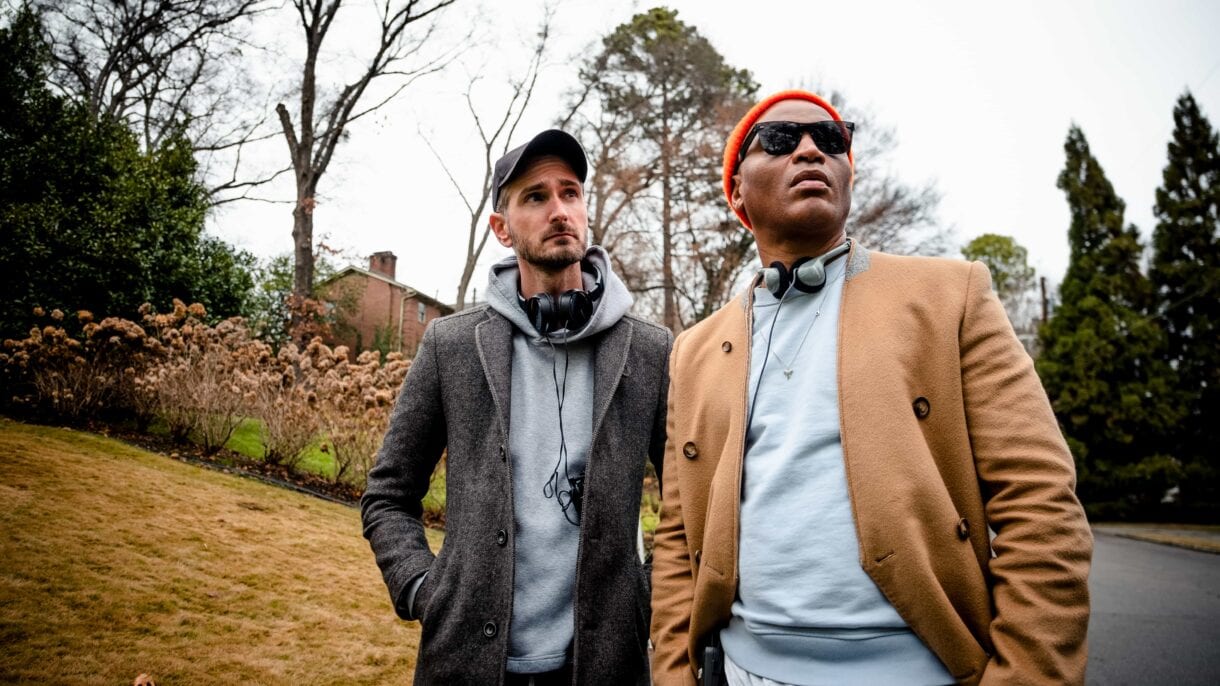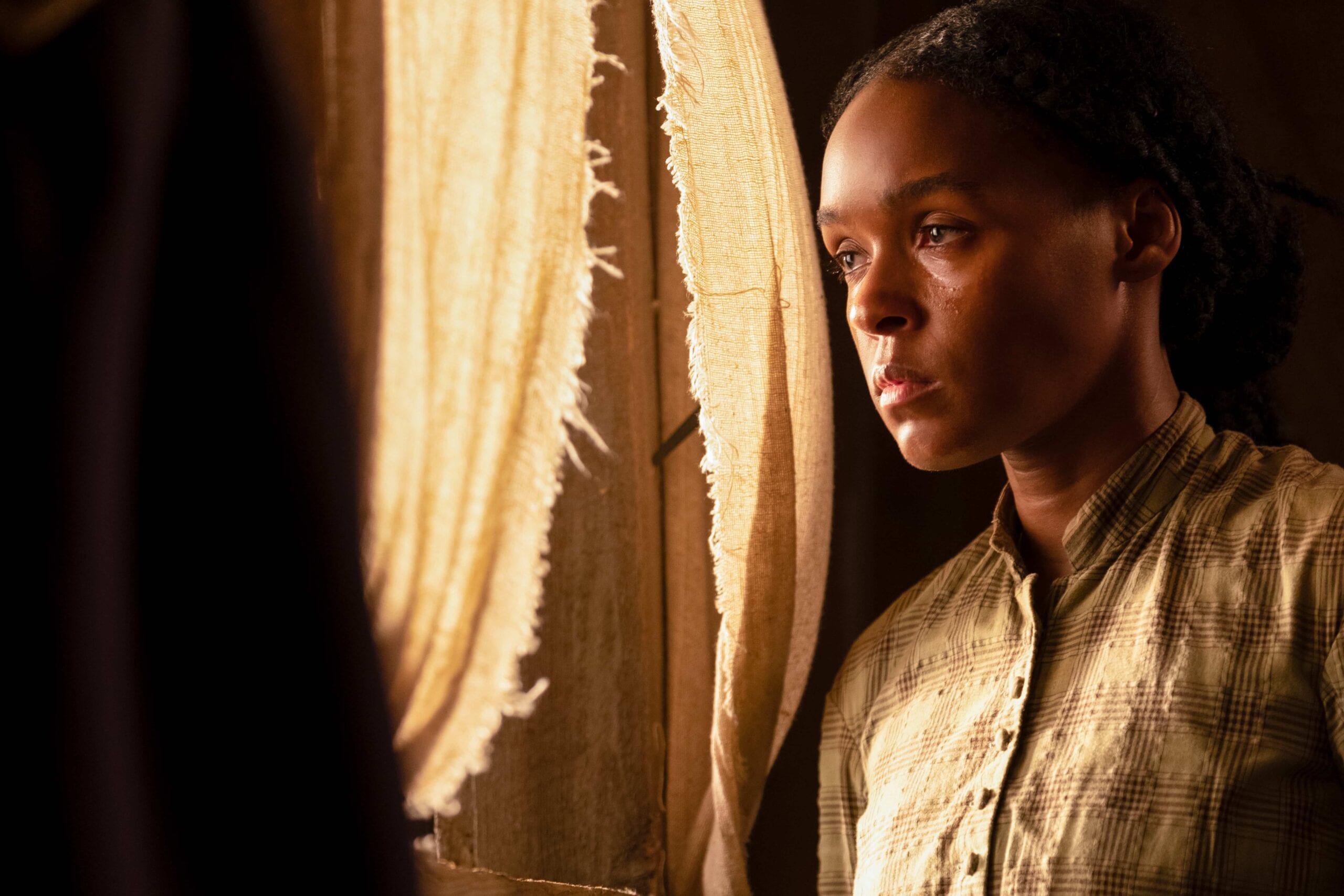Releasing a film in 2020 that’s rooted in the enslavement of Black people in America is a decidedly bold choice. Audiences have made it clear that white saviour narratives and those about the brutalization, marginalization and otherwise painful and traumatic experiences of Black folks won’t receive universal praise. The reception of and recent conversations surrounding films like 2011’s The Help, 2013’s 12 Years a Slave, 2017’s Detroit and 2018’s Green Book are proof. But filmmakers and life partners Gerard Bush and Christopher Renz, known professionally as Bush + Renz, did it anyway with the Janelle Monáe-fronted Antebellum, in limited theatres and on-demand Sept. 18. “I contextualize it differently,” says Bush, rebuffing the idea that the picture, which he calls a “re-contextualizing [of] this country’s original sin,” is a slave movie. “We know that it’s a really disruptive piece of art, which is really the point. I think that art is meant to divide. It’s meant to catalyze and activate a conversation.” And that’s exactly what they’ve got, even if only film critics have seen it so far. Antebellum follows a Black woman named Veronica (Monáe), a successful and prominent contemporary author, who is abducted and taken back in time to the antebellum period, where she is enslaved on a 19th-century plantation. The psychological thriller, which also stars Eric Lange, Jena Malone, Jack Huston, Kiersey Clemons and Gabourey Sidibe, centres on her fight to emancipate herself and others. The film is Bush and Renz’s first feature after launching their careers in fashion and luxury advertising. They’ve directed national campaigns for Harry Winston and Vogue as well as a number of socially-conscious short films and music videos—including “Kill Jay-Z,” which accompanied the rapper’s 4:44 album, and a 2017 Harry Belafonte-produced PSA Against The Wall. Critics of Antebellum are relatively split. Some see the picture as super timely and relevant given the last few months of social unrest in every U.S. state; Variety’s Peter Debruge called it “a potent, politically charged cross between The Handmaid’s Tale and an M. Night Shyamalan movie.” Others, like Polygon’s Robert Daniels, have described the picture as exploitative, shallow and “easily 2020’s worst movie so far.” I’m decidedly somewhere between the two: I’m a forever fan of Monáe and her ongoing foray into Hollywood. And while I appreciate her attempt to breathe life and energy into the role of Veronica, I’m stuck on the film’s story, which is at once inspired and perplexing—and potentially triggering and traumatic to Black people and others whose ancestors were enslaved not that many generations ago. I spoke with Bush, who is Black, and Renz, who is white, over the phone about the split in critics’ reception of the film, how being an interracial gay couple informed their approach and their desire for audiences to, in Bush’s words, “not spray graffiti all over the art before you have a chance to experience it.”
Before we get into the film, talk to me about your backgrounds.
Bush: Well, we have been together for 12 years. We are a couple first and foremost, and then we are creative partners. I’m Black and Christopher’s white and we are keenly aware of how delicate the rights that we currently enjoy are. For us, it was never an option not to engage in activism through our work. That was always the goal. I don’t know how anyone could be living in this moment, this latest inflection point in the country that stemmed from democracy, and not be an activist. I walked my dog this morning and I could barely breathe because California is on fire. We’ve got a lunatic in the White House; a racist, incompetent lunatic. We have a global pandemic, and a climate crisis that just won’t be delayed—it’s not taking a moment or a pause because we have these other issues. And then we have a great racial reckoning. So for us, the work that we’ve been doing for the past decade has been informed by all of these issues. And I guess you could refer to us—although I don’t want to sound self-aggrandizing—as polymath, because we’re willing to use any artistic weaponry at our disposal to activate people out of their complacency before we sleepwalk off a cliff.

Filmmakers and life partners Christopher Renz and Gerard Bush. Credit: Kyle B Kaplan
What inspired the story of Antebellum?
Bush: To be honest, had we ideated on this movie we probably wouldn’t have pursued it—much less ended up making it—because the idea for Antebellum was seeded from a nightmare that I had. The nightmare felt deeply ancestral and it will go down as one of the most moving experiences that I’ve had while not really awake or asleep; I don’t know what it was, but it was definitely something that felt like it was from the ancestors. This woman was screaming across dimensions, trying to reach help. She would refer to the cell phone as the freedom device. She would never refer to her tormentor by name, only as “him.” This really creepy, crazy nightmare. We wrote a short story from that nightmare. That was in October 2017. Then we wrote the script based on the short story, and we finished the first draft in February 2018.
Do you think the movie would’ve been received differently if we hadn’t had the last few months of social unrest and the pandemic and everything else?
Renz: We don’t know yet, because the movie comes out Friday [laughs]. The critics are deeply divided, and that’s great because we want it to be polarizing. We want them to have these conversations. However, we’re not interested in people policing art. At the end of the day, you have every right to your opinion. [It’s] the way that art should be made: It’s for you to decide how you receive and experience the art that we’ve made. We’re excited about what conversations will be born from Antebellum, having such wide distribution in so many American homes. I think that we are in the midst of a nightmare as it is, and the movie is a nightmare but [it’s] a nightmare that also [has] catharsis. There is medicine within this thrill. You just have to process it and think about it. Our ardent hope is that people start thinking real hard about this country’s future. And that they wear a mask, put gloves on and walk, run, crawl to the polls on November 3rd. Bush: I would say that on Friday, the movie is no longer ours. It’s for the world. We said exactly what we wanted to say in the movie.
I often wonder about set environments for films where enslavement is involved. What was yours like?
Bush: We were determined to create an environment that welcomed an ongoing dialogue about and around what we were doing and why. It was remembering that we do not want to serve as co-conspirators in the erasure of this country’s history—there’s already been enough of that. So the brutality and violence in the movie is only a fraction of what African enslaved people experienced in reality on those plantations.
And y’all filmed on an actual plantation, right?
Bush: It seemed like a good idea to shoot on an actual plantation. But when you are actually on the Evergreen Plantation, it is an open-air haunted house. That energy, you can actually use that. For me, psychologically, I felt like I could smell the blood. And so we were really careful and respectful.
As gay men and as an interracial couple, how did those identities inform your to approach this story in terms of figuring out what to centre?
Bush: We were really specific in using our experiences as a unit. I mean, Christopher and his exposure to what white people really think and say about Black people when no one else is around—that was something that we definitely accessed, understanding that many people present themselves one way in the public square and are completely different when behind a computer and veiled in anonymity. That played a role in how we decided to thread that needle for Antebellum. Renz: I would say that, in the past 12 years being with Gerard, we are surrounded by Veronicas, these incredible Black women, and we don’t see them on screen in their full power. That was incredibly important, reflecting what we see every day and putting that on the screen.
With all of these calls for a commitment toward being anti-racist and amplifying Black voices, what is the call to arms or the takeaway that you hope audiences will have from the film?
Bush: We hope first and foremost that they have a conversation. But then also that they understand, until we have the courage and the willingness to confront this country’s original sin of building America on the backs of stolen bodies and free labour, we’re going to continue to find ourselves haunted and plagued by it in our present and, in all likelihood, see our shared futures robbed of all of us. We need to confront this issue. We’re going to have to first dismantle the scaffolding that continues to serve as an underpinning to this inequity, and then we’re going to have to create something new that feels fair and equitable.
I’m always interested, with films like Antebellum, if there’s supposed to be a different takeaway for Black people than for white people.
Renz: I would say for white audiences, the film is important in the way that we depict the Antebellum South in that we have done a terrible job in America of educating the population on how this country was built. And I would say that in Germany, no one would ever think to have a wedding at Auschwitz. Yet, in America, weddings on plantations happen all the time. We have not educated the population as to what happened, because if we did, those weddings would never happen. Bush: To add about Black folks: I think that it’s a perfect storm of creating further erasure of the actual history. Because we as Black folks are so often really uncomfortable with slave narratives and seeing our people in bondage and having to revisit that. And look, I understand it, I get it. But then I look at our beautiful Jewish community and how they are really vigilant in protecting the narrative and making sure that we never forget the truth of the past because it can repeat itself easily. We as Black people also need to be careful not to serve as co-conspirators in the erasure of our own history. They want us to continue to do this dance of a lie, of the nobility of the Antebellum South, of this beauty of Scarlet and Gone With the Wind. We were so determined to correct the records that we obtained the lenses from Gone with the Wind and shot our movie on those lenses. So there’s a lot more to Antebellum than meets the eye.
You’ve mentioned that the critics are split, but that you want people to have conversation as a result of viewing this film. Do you think you’ve accomplished that?
Bush: We’re not looking to just make something for entertainment’s sake. We have Michael Eric Dyson, who thinks that the movie is a stroke of brilliance. We have another person that says, “I’m so sick of these movies.” We’re going to have a polarized conversation around Antebellum, but I hope that in those conversations we don’t lose sight of the bigger picture: That we need to wake up and activate ourselves into real, meaningful action now. This era that we’ve entered into is going to call for a different type of storytelling. We’ve been distracted long enough by the idea of a saviour with a cape coming down from another planet to save us. It is only us who can save us. I hope that Antebellum will activate other filmmakers into the idea of telling stories that can address these really urgent issues that we find ourselves facing. There is still so much power and potency in cinema; when you have the audacity to say something that matters, you’re going to be attacked. So you’ve got to get ready for that. No filmmaker likes that, but it’s just necessary work. Antebellum is available on demand and showing in some theatres beginning Sept. 18.


 Why you can trust Xtra
Why you can trust Xtra


